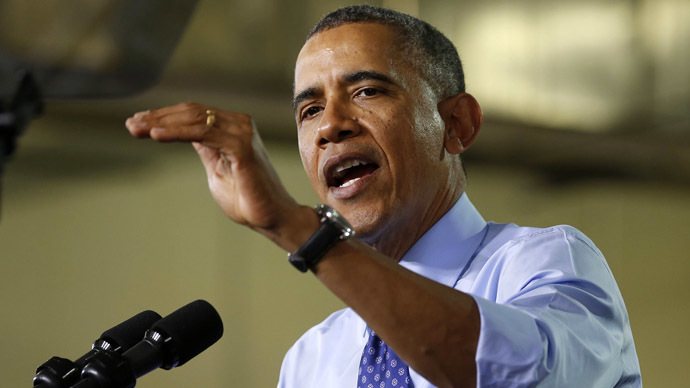Sanctions: The sanctimonious solution

As Moscow withdrew its troops from the border with Ukraine, President Obama announced further sanctions against Russian politicians and businessmen to a chorus of economists gleefully predicting the havoc to be wrought on the Russian economy.
Of course, there’s not much evidence that sanctions have every actually achieved anything beyond making life difficult for lesser or greater numbers of people. Furthermore, the entire idea runs counter to the creed of global market liberalization so openly embraced by the very people who support slapping sanctions on anyone who indicates that they may not be in complete accord with them on each and every topic under the sun.
The World Trade Organization (WTO), for example, was supposed to prevent nations from using their economies as a tool in the service of their own political interests. This has long served as the rationale for the WTO’s limited consideration of social rights or the environment when rendering its decisions.
In the world of international law, sanctions are therefore a bit passé, really. They may have sounded like a good idea 20 years ago, but we’ve all moved on since then.
Thus, the idea that the USA and Europe are somehow going to bludgeon Russia into submission using a tool that much-more-vulnerable Cuba has blithely held out against for over half a century, is at first glance, worth a laugh. After all, it’s an open secret that the only country the US has managed to isolate with its sanctions has long been itself. In fact, before Gaddafi was ousted in 2011, the United States was – thanks to the long-standing Pan-Am controversy – virtually the only country that wasn’t getting oil concessions out of Libya.
Much has been said about the overweening arrogance sanctioning Russia displays Max Keiser’s article earlier this week was particularly interesting, especially since it hasn’t been possible to portray these sanctions as the usual punishment for not having a ‘democratic’ government. Are Western leaders really so out of touch that they think Russia will give in because it is being sanctioned by the US and Europe?
I doubt it.
There’s a deeper game here and it is as follows: 1) sanctioning Russia makes it look like Western leaders are actually doing something (thereby satisfying public opinion at home); 2) if I were a betting woman, I would put money on it coming out someday that these sanctions were laid down in a manner curiously advantageous to certain Western businesses; 3) as far as Western leaders are concerned it isn’t Russia that is the problem, it’s Putin. I think they’ve gotten the message that Putin is not the ‘caving in’ type. So rather than get him to back down, they’d probably rather just get rid of him. Hence the litany of complaints personally directed against Putin over the past several months.
It might surprise many Russians to learn that a large segment of the North American population believes that Vladimir Putin is an unelected dictator and that they are paranoid of being put under surveillance by him. I understand that you may need to read that twice to take it all in. Most people react to my telling them that I write for RT as if I have just announced that I have a license to kill.
But difficult as it is, try to see things from the point of view of your average Western power-broker. They can remember the good old times, when Yeltsin was in charge (using that term loosely) and Russia was an investment bonanza, a real “free market”, plentiful in crony capitalism with minimal social security and all the natural resources you can take.
They would like that back.
And after that, they would like a similar arrangement in China, please.
Once that is accomplished everyone will finally be on the same wavelength and the world will be remarkably conflict-free. It wouldn’t matter so much where Ukraine chose to make its political and economic alliances, because under this scenario the money would all be flowing into the same pockets, anyway and at a rate rapid enough to keep everyone satisfied.

And Western leaders think that they have a certain chance of getting Part 1 of their policy taken care of, because they are hoping that if they can cause the Russian economy to tank, it will eventually, when the dust has settled, hit Putin’s popularity so hard as to hurt his chances of re-election. This is a basic tactic that is used a lot in international negotiations. It’s played by getting anyone you think is a tough negotiator removed from their job by spreading misinformation about them back to their home government or simply outright demanding that the home government sack them in order for negotiations to proceed at all.
You can see both of these tactics at play in regards to Putin at the moment. I’m all for a healthy dose of criticism in domestic politics, but Russia as spy state using covert operations to topple governments while simultaneously placing us all under surveillance sounds a lot like Western leaders just cobbled together everyone’s complaints about them and hurled them at the new/old arch-enemy. Classic misinformation.
Sanctions are an example of tactic two: I don’t like you so I’m not going to deal with you. If your country wants to talk to me they have to send someone with a better attitude, which means someone who thinks that the word ‘negotiation’ means that we do whatever I want. People sometimes wonder at the high proportion of idiots given government posts. Now you know. If you have a backbone, your survival chances decrease dramatically, because you get hit-listed.
Consider further that this kind of aggressive action is necessary for Western leaders, because their backs are already against the wall. Their own constituents are fed-up to levels that haven’t been seen since the 1960s, with inequality growing daily. The largest political parties have already decided that they are in the game for themselves, with few differences to speak of between their policies. Thus, they only have two choices – continue going with whatever policies suit their wealthy campaign backers or do an about-face and start compromising with ‘the people’.
Needless to say, that would burn the bridge with campaign financiers, and since that relationship has been ongoing for a very long time, taking the plunge to change things around seems like a pretty big risk. So no one does it, and they just continue doing what they’ve done for the last 20 years, which is to try to steamroll everything in their path.
This is the real logic behind sanctions: an attempt to make the Russian leadership unpopular with its own businesses and citizens to the point that a more conciliatory party and leader are elected. No easy task, clearly, since imposing sanctions which exclusively hit Russia involves a fair bit of cherry-picking.
Western politicians seem determined to follow this course to the bitter end rather than acknowledge that their own political interests may not be the only ones on Earth or that we might be under some sort of obligation to negotiate with the elected leaders of other nations.
The statements, views and opinions expressed in this column are solely those of the author and do not necessarily represent those of RT.
The statements, views and opinions expressed in this column are solely those of the author and do not necessarily represent those of RT.













